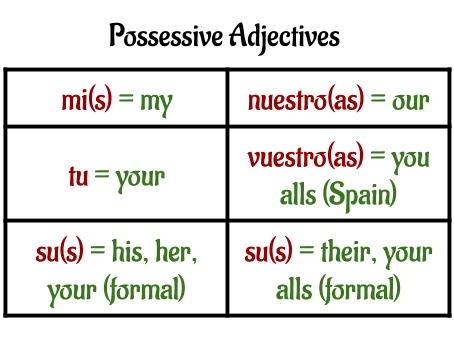Possessive Adjectives
|
|
Possessive Adjectives are just what the name implies... Adjectives that show possession. Here are a few examples in English. The possessive adjectives are in bold.
Ex. My house is your house.
Your car is red.
His house is not white. It is blue.
My dogs are fun.
Our cheerleaders are the best.
Just like in English, the possessive adjective is placed before the noun it is possessing. Like all Adjectives in Spanish, the possessive adjective will agree with the noun in both number (plural/singular) and gender (masculine/feminine).
(Click here for a review of the Number & Gender of Nouns concept)
NOTE: Only “nuestro” and “vuestro” will agree in gender (masculine/feminine) AND number (singular/plural)
Here is the Chart for the Possessive Adjectives and their corresponding translations into English:
Ex. My house is your house.
Your car is red.
His house is not white. It is blue.
My dogs are fun.
Our cheerleaders are the best.
Just like in English, the possessive adjective is placed before the noun it is possessing. Like all Adjectives in Spanish, the possessive adjective will agree with the noun in both number (plural/singular) and gender (masculine/feminine).
(Click here for a review of the Number & Gender of Nouns concept)
NOTE: Only “nuestro” and “vuestro” will agree in gender (masculine/feminine) AND number (singular/plural)
Here is the Chart for the Possessive Adjectives and their corresponding translations into English:
Ex. Mi casa es su casa.
Tu coche es rojo.
Su casa no es blanca. Es azul.
Mis perros son divertidos.
Nuestras animadoras son las mejores.*
*Notice with this sentence, that nuestro changes to match both the gender and number of the noun - animadoras.
The noun (animadoras) is both Feminine and plural, therefore the possessive adjective nuestro becomes nuestras.
But... what happens when you don't use a possessive adjective, but instead a noun? For example: Bob's cat?
The Possessive S...
Possessive "S" doesn’t exist in Spanish! You cannot say “Juan’s casa is blue”. Instead, you have to phrase it differently by using the word “de”. You would say “the house of Juan”= “La casa de Juan es azul”.
NOW YOU TRY!
Tu coche es rojo.
Su casa no es blanca. Es azul.
Mis perros son divertidos.
Nuestras animadoras son las mejores.*
*Notice with this sentence, that nuestro changes to match both the gender and number of the noun - animadoras.
The noun (animadoras) is both Feminine and plural, therefore the possessive adjective nuestro becomes nuestras.
But... what happens when you don't use a possessive adjective, but instead a noun? For example: Bob's cat?
The Possessive S...
Possessive "S" doesn’t exist in Spanish! You cannot say “Juan’s casa is blue”. Instead, you have to phrase it differently by using the word “de”. You would say “the house of Juan”= “La casa de Juan es azul”.
NOW YOU TRY!
- María’s book. = el libro de María
- Pedro’s backpack = la mochila de Pedro
- Lupe’s parents = los padres de Lupe
- José’s friend = el amigo de José
- Sr. Johnson's class = la clase de Sr Johnson

